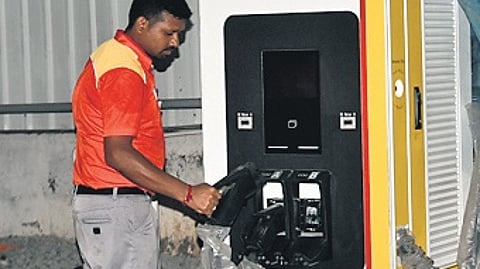Tamil Nadu: Talks on to set up South India’s first battery recycling plant in Krishnagiri
CHENNAI: One of the largest battery recycling plant in India is likely to be set up at SIPCOT’s future mobility park at Shoolagiri in Krishnagiri. Talks are progressing with a key player in the sector, according to official sources, who refused to divulge further details.
Sources told TNIE, on the sidelines of an event, that the firm will not only recycle used batteries but also electrical and rare earth magnets. The move is significant as recycling spent batteries can help build material security and minimise environmental hazards from the e-waste.
It may be noted that Pondy Oxides & Chemicals Limited signed a memorandum of understanding (MoU) with the Tamil Nadu government during the Global Investors’ Meet in January to invest Rs 300 to Rs 500 crore for setting up state-of-the-art recycling and manufacturing plants for non-ferrous metals, lithium ion batteries, paper, plastics, and rubber.
Niti Aayog in its 2022 report, Advanced Chemistry Cell Battery Reuse and Recycling Market in India, estimates that the cumulative potential of lithium-ion batteries in India during 2022-30 will be around 600 GWh across all segments in the base case. Of this, 128 GWh will be available for recycling by 2030 with 46% (59 GWh) coming from electric vehicles alone.
Thiru Srinivasan, senior advisor (Electric Vehicles) for Tamil Nadu government, said that the battery facility, which is likely to come up on 20 acres, will also recycle rare earth minerals to secure the supply of sustainable rare earth materials to support growth of electric vehicles. Rare earth magnets are a main component found in electric motors. Electric cars manufactured in Chennai require a kilogram of magnet to provide the motion needed to fire engines Srinivasa said that the country has only two battery recycling units at present, both of which are in North India.
Meanwhile, SIPCOT is planning to set up cafes along highways on the city outskirts and arterial roads. They will have charging points for EVs, said an official source from Sipcot, adding that electronic manufacturing clusters will also be set up at Mannalur and Pillaipakkam.
EV transition to affect MSMEs in Hosur
A report on the transition to electric vehicles states that 20% of component manufacturers in Hosur would be affected and that 45-84% components of ICE vehicles will become obsolete.
The International Forum for Environment, Sustainability and Technology (iFOREST), a non-profit environmental think tank, released the first comprehensive study - ICE to EV: Just Transition Roadmap for India’s Automobile Sector - in association with the Confederation of Indian Industry (CII).
The report highlighted Hosur, one of the auto clusters in Tamil Nadu, and delved into the challenges and opportunities of transition to EVs for businesses, workers and the environment at large. An analysis of 759 auto component manufacturers in the Hosur cluster showed that about 20% would be highly or moderately impacted by the transition.

